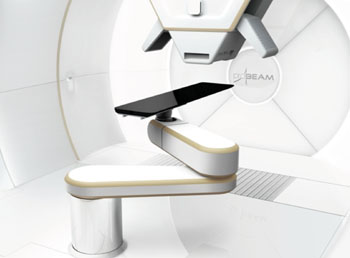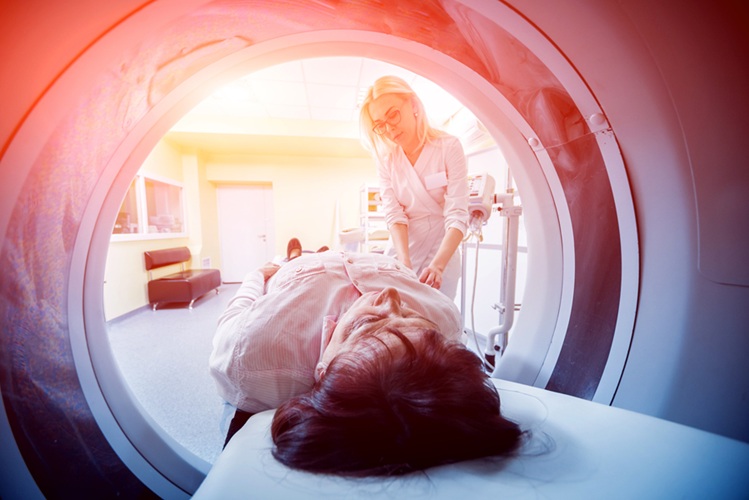Taipei University to Install Proton Treatment Center
|
By MedImaging International staff writers Posted on 19 Jun 2014 |

Image: The Varian ProBeam proton therapy system (Photo courtesy of Varian).
New technology enables intensity-modulated proton therapy (IMPT) by modifying dose levels on a spot-by-spot basis throughout the treatment area. Scanning beam technology makes it possible to combine irradiations from multiple angles in an optimal manner to improve control of dose distributions.
Varian Medical Systems (Palo Alto, CA, USA) has signed an agreement with YongLin Healthcare Foundation by which Varian will provide its ProBeam proton therapy system for deployment at the National Taiwan University (Taipei). The YongLin Healthcare Foundation will donate the system to the University.
Varian, under the purchase agreement, will provide the technology to equip three treatment rooms, two with gantries that rotate around the patient and one as a fixed-beam room. In addition to the ProBeam system, Varian will provide its ARIA information management and Eclipse treatment planning software products. The expected total value of the agreement is estimated to be about USD 100 million, including long-term operations and maintenance services. Equipment installation is expected to take place in mid-2017, with patient treatments expected to begin in the second half of 2018.
Proton therapy makes it possible to treat specific types of cancer more precisely and with potentially fewer side effects than is possible with conventional radiation therapy. With proton therapy, the risk of damage to healthy tissues is reduced. The method can be applied for many of the most common types of cancer and offers advantages when treating tumors close to radiosensitive tissues. In pediatric patients the risk of developing a new, radiation-induced cancer later in life can be reduced.
The technology has already been installed at the Scripps Proton Therapy Center (San Diego, CA, USA). Varian proton therapy technology is also in place at the Rinecker Proton Therapy Center (Munich, Germany), and the Paul Scherer Institute (Villigen, Switzerland). Varian has contracts to install ProBeam systems at six additional centers.
Varian Medical Systems is a world-leading manufacturer of medical devices and software for treating cancer and other medical conditions with radiotherapy, radiosurgery, and brachytherapy. The company supplies informatics software for managing comprehensive cancer clinics, radiotherapy centers and medical oncology practices.
Related Links:
Varian Medical Systems
National Taiwan University
Varian Medical Systems (Palo Alto, CA, USA) has signed an agreement with YongLin Healthcare Foundation by which Varian will provide its ProBeam proton therapy system for deployment at the National Taiwan University (Taipei). The YongLin Healthcare Foundation will donate the system to the University.
Varian, under the purchase agreement, will provide the technology to equip three treatment rooms, two with gantries that rotate around the patient and one as a fixed-beam room. In addition to the ProBeam system, Varian will provide its ARIA information management and Eclipse treatment planning software products. The expected total value of the agreement is estimated to be about USD 100 million, including long-term operations and maintenance services. Equipment installation is expected to take place in mid-2017, with patient treatments expected to begin in the second half of 2018.
Proton therapy makes it possible to treat specific types of cancer more precisely and with potentially fewer side effects than is possible with conventional radiation therapy. With proton therapy, the risk of damage to healthy tissues is reduced. The method can be applied for many of the most common types of cancer and offers advantages when treating tumors close to radiosensitive tissues. In pediatric patients the risk of developing a new, radiation-induced cancer later in life can be reduced.
The technology has already been installed at the Scripps Proton Therapy Center (San Diego, CA, USA). Varian proton therapy technology is also in place at the Rinecker Proton Therapy Center (Munich, Germany), and the Paul Scherer Institute (Villigen, Switzerland). Varian has contracts to install ProBeam systems at six additional centers.
Varian Medical Systems is a world-leading manufacturer of medical devices and software for treating cancer and other medical conditions with radiotherapy, radiosurgery, and brachytherapy. The company supplies informatics software for managing comprehensive cancer clinics, radiotherapy centers and medical oncology practices.
Related Links:
Varian Medical Systems
National Taiwan University
Latest Industry News News
- GE HealthCare and NVIDIA Collaboration to Reimagine Diagnostic Imaging
- Patient-Specific 3D-Printed Phantoms Transform CT Imaging
- Siemens and Sectra Collaborate on Enhancing Radiology Workflows
- Bracco Diagnostics and ColoWatch Partner to Expand Availability CRC Screening Tests Using Virtual Colonoscopy
- Mindray Partners with TeleRay to Streamline Ultrasound Delivery
- Philips and Medtronic Partner on Stroke Care
- Siemens and Medtronic Enter into Global Partnership for Advancing Spine Care Imaging Technologies
- RSNA 2024 Technical Exhibits to Showcase Latest Advances in Radiology
- Bracco Collaborates with Arrayus on Microbubble-Assisted Focused Ultrasound Therapy for Pancreatic Cancer
- Innovative Collaboration to Enhance Ischemic Stroke Detection and Elevate Standards in Diagnostic Imaging
- RSNA 2024 Registration Opens
- Microsoft collaborates with Leading Academic Medical Systems to Advance AI in Medical Imaging
- GE HealthCare Acquires Intelligent Ultrasound Group’s Clinical Artificial Intelligence Business
- Bayer and Rad AI Collaborate on Expanding Use of Cutting Edge AI Radiology Operational Solutions
- Polish Med-Tech Company BrainScan to Expand Extensively into Foreign Markets
- Hologic Acquires UK-Based Breast Surgical Guidance Company Endomagnetics Ltd.
Channels
Radiography
view channel
AI Improves Early Detection of Interval Breast Cancers
Interval breast cancers, which occur between routine screenings, are easier to treat when detected earlier. Early detection can reduce the need for aggressive treatments and improve the chances of better outcomes.... Read more
World's Largest Class Single Crystal Diamond Radiation Detector Opens New Possibilities for Diagnostic Imaging
Diamonds possess ideal physical properties for radiation detection, such as exceptional thermal and chemical stability along with a quick response time. Made of carbon with an atomic number of six, diamonds... Read moreMRI
view channel
Cutting-Edge MRI Technology to Revolutionize Diagnosis of Common Heart Problem
Aortic stenosis is a common and potentially life-threatening heart condition. It occurs when the aortic valve, which regulates blood flow from the heart to the rest of the body, becomes stiff and narrow.... Read more
New MRI Technique Reveals True Heart Age to Prevent Attacks and Strokes
Heart disease remains one of the leading causes of death worldwide. Individuals with conditions such as diabetes or obesity often experience accelerated aging of their hearts, sometimes by decades.... Read more
AI Tool Predicts Relapse of Pediatric Brain Cancer from Brain MRI Scans
Many pediatric gliomas are treatable with surgery alone, but relapses can be catastrophic. Predicting which patients are at risk for recurrence remains challenging, leading to frequent follow-ups with... Read more
AI Tool Tracks Effectiveness of Multiple Sclerosis Treatments Using Brain MRI Scans
Multiple sclerosis (MS) is a condition in which the immune system attacks the brain and spinal cord, leading to impairments in movement, sensation, and cognition. Magnetic Resonance Imaging (MRI) markers... Read moreUltrasound
view channel.jpeg)
AI-Powered Lung Ultrasound Outperforms Human Experts in Tuberculosis Diagnosis
Despite global declines in tuberculosis (TB) rates in previous years, the incidence of TB rose by 4.6% from 2020 to 2023. Early screening and rapid diagnosis are essential elements of the World Health... Read more
AI Identifies Heart Valve Disease from Common Imaging Test
Tricuspid regurgitation is a condition where the heart's tricuspid valve does not close completely during contraction, leading to backward blood flow, which can result in heart failure. A new artificial... Read moreGeneral/Advanced Imaging
view channel
AI-Based CT Scan Analysis Predicts Early-Stage Kidney Damage Due to Cancer Treatments
Radioligand therapy, a form of targeted nuclear medicine, has recently gained attention for its potential in treating specific types of tumors. However, one of the potential side effects of this therapy... Read more
CT-Based Deep Learning-Driven Tool to Enhance Liver Cancer Diagnosis
Medical imaging, such as computed tomography (CT) scans, plays a crucial role in oncology, offering essential data for cancer detection, treatment planning, and monitoring of response to therapies.... Read moreImaging IT
view channel
New Google Cloud Medical Imaging Suite Makes Imaging Healthcare Data More Accessible
Medical imaging is a critical tool used to diagnose patients, and there are billions of medical images scanned globally each year. Imaging data accounts for about 90% of all healthcare data1 and, until... Read more
Global AI in Medical Diagnostics Market to Be Driven by Demand for Image Recognition in Radiology
The global artificial intelligence (AI) in medical diagnostics market is expanding with early disease detection being one of its key applications and image recognition becoming a compelling consumer proposition... Read moreIndustry News
view channel
GE HealthCare and NVIDIA Collaboration to Reimagine Diagnostic Imaging
GE HealthCare (Chicago, IL, USA) has entered into a collaboration with NVIDIA (Santa Clara, CA, USA), expanding the existing relationship between the two companies to focus on pioneering innovation in... Read more
Patient-Specific 3D-Printed Phantoms Transform CT Imaging
New research has highlighted how anatomically precise, patient-specific 3D-printed phantoms are proving to be scalable, cost-effective, and efficient tools in the development of new CT scan algorithms... Read more
Siemens and Sectra Collaborate on Enhancing Radiology Workflows
Siemens Healthineers (Forchheim, Germany) and Sectra (Linköping, Sweden) have entered into a collaboration aimed at enhancing radiologists' diagnostic capabilities and, in turn, improving patient care... Read more


















